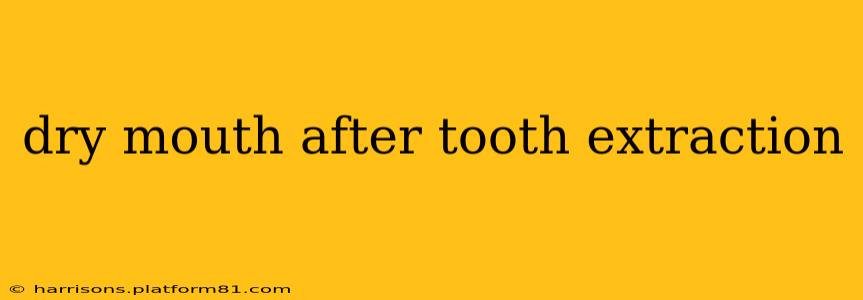Dry mouth, or xerostomia, is a common side effect after tooth extraction. It can be uncomfortable and even impact healing, making it crucial to understand its causes, prevention strategies, and effective treatment options. This comprehensive guide will address everything you need to know about managing dry mouth following a tooth extraction.
Why Do I Have Dry Mouth After a Tooth Extraction?
Several factors contribute to dry mouth post-extraction. The most prominent is the anesthesia. Local anesthetic injections often temporarily affect salivary glands, reducing saliva production. Additionally, certain pain medications, particularly opioids, can have a drying effect on the mouth. The surgical trauma itself can also temporarily disrupt normal salivary function. Finally, anxiety and stress related to the procedure can exacerbate dry mouth.
How Long Does Dry Mouth Last After Tooth Extraction?
The duration of dry mouth varies significantly from person to person. For most, it's a temporary issue resolving within a few hours to a couple of days after the procedure as the effects of anesthesia and medication wear off. However, in some cases, it may persist for longer, particularly if you are taking medications known to cause dry mouth. If your dry mouth is persistent or severe, consult your dentist or doctor.
What Can I Do to Prevent Dry Mouth After a Tooth Extraction?
Proactive measures can significantly reduce the likelihood or severity of post-extraction dry mouth:
- Stay Hydrated: Drinking plenty of water is crucial. Aim for consistent sips throughout the day, especially in the hours following your extraction.
- Avoid Alcohol and Caffeine: Both are diuretics and can further dehydrate you, worsening dry mouth symptoms.
- Sugar-Free Gum or Candy: Chewing sugar-free gum or sucking on sugar-free hard candies stimulates saliva production. Be cautious about this immediately after surgery, however, to avoid disturbing the extraction site.
- Humidifier: Using a humidifier, particularly at night, can add moisture to the air and help alleviate dry mouth.
Can Mouthwash Cause Dry Mouth After Tooth Extraction?
Some mouthwashes, especially those containing alcohol, can exacerbate dry mouth. It's best to avoid alcohol-based mouthwashes for a few days after your extraction. Your dentist might recommend a specific mouthwash to aid healing; follow their instructions carefully. Plain saline rinses are generally a safe alternative.
What Are the Best Treatments for Dry Mouth After Tooth Extraction?
While the dry mouth usually resolves on its own, several remedies can provide relief:
- Saliva Substitutes: Over-the-counter saliva substitutes can help lubricate your mouth and provide temporary relief.
- Artificial Saliva Sprays: These offer a convenient way to quickly relieve dryness.
- Prescription Medications: If your dry mouth is severe or persistent, your dentist or doctor might prescribe medication to stimulate saliva production.
How Can I Tell if My Dry Mouth is Serious?
While mild dry mouth is a common, temporary side effect, persistent or severe dry mouth warrants attention. If your dry mouth is accompanied by other symptoms like persistent throat pain, difficulty swallowing, or a significant impact on your ability to eat or speak, contact your dentist or doctor immediately. These could indicate an underlying issue requiring further investigation.
Is Dry Mouth After a Tooth Extraction a Sign of Infection?
Dry mouth itself isn't a sign of infection, but it can make you more susceptible to one. Good oral hygiene, including gentle rinsing with saline solution, is crucial to prevent infection. Watch out for signs of infection, such as increased pain, swelling, redness, or pus around the extraction site, and seek immediate dental care if you suspect an infection.
This information is for general knowledge and does not constitute medical advice. Always consult with your dentist or doctor for diagnosis and treatment of any medical condition. They can provide personalized recommendations based on your specific situation and medical history.
